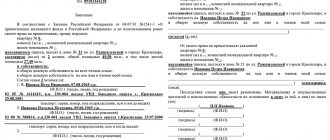Article updated: October 4, 2020
Author of the article Alexey BessonovPracticing Moscow lawyer
Hello. I am a visiting lawyer from the Bessonov and Partners law firm. I specialize in discharging citizens in court.
In paragraph 1 of Art. 35 Housing Code of the Russian Federation and paragraphs. 5 (f) clause 31 of Government Decree No. 713 dated July 17, 1995, it is clearly written that it is possible to discharge any person from an apartment without his consent only THROUGH THE COURT. This also applies to people who refused to participate in privatization. There is no other way.
It is extremely difficult to discharge such a person from the apartment. After all, having refused privatization, he now has the right to indefinite use (residence) in the apartment. And even if the owner of the apartment has changed - Art. 19 of Federal Law No. 189 of December 29, 2004. But you can try to write it out if certain conditions are met.
IMPORTANT : There are two types of citizens who refuse privatization: 1) Of their own free will. 2) They have already spent their right because they participated in the privatization of other housing. When discharged, these are two identical cases.
Only under these conditions will it be possible to discharge someone who refused privatization
They are listed in paragraph 3 of the Review of Judicial Practice of the Supreme Court for January-July 2014. That is, a “refusenik” can be discharged only when, through his actions, he HIMSELF renounced his right of residence, so he can be recognized as having lost this right.
It makes no difference who the person who refused to participate in privatization is or was the owner - a former husband or wife, son, daughter, parent, grandfather, grandmother, brother, sister, uncle, aunt or a stranger. The conditions are the same for everyone and are considered by the judge in their entirety. I will list them in the form of a chain:
- A person who refuses to participate in privatization does not live in the apartment for a long time - clause 3 of Art.
83 Housing Code of the Russian Federation. Although this article of the law talks about the termination of a social tenancy agreement when leaving a municipal apartment, and our apartment is already privatized, it is applied here by analogy - Art. 7 Housing Code of the Russian Federation. No period of non-residence is established in any official document, but in practice the minimum is 3 years . This is exactly the deadline that I and my colleagues who participate in the courts for the deportation of citizens have determined. We have also read quite a few similar court decisions. If a “refusenik” does not live for 1 year, the chance of being discharged is only 20%. If 2 years - 50%. If 3 years - 90%.↓ - I left the apartment on a permanent basis, and not temporarily due to study, work, business trips, treatment, etc. I took all my things out of the apartment. This is stated in Art. 71 Housing Code of the Russian Federation.↓
- Left voluntarily, and not forced - clause 2 of Art. 1 Residential Complex of the Russian Federation. For example, you cannot discharge a person if he left due to conflicts with the owners of the apartment and proves this. Or is in prison. You can, of course, submit the court verdict to the passport office and it will be “formally” issued. After leaving prison, he can register back without any problems. Even the new owners won't sign him out. I wrote about this at the very beginning of the article.↓
- He does not pay utility bills, does not participate in the repair and maintenance of the apartment for at least 3 years (clause 4 of article 69 of the Housing Code of the Russian Federation). This period is similar to the minimum period of non-residence.↓
- He did not try to move into the apartment again, and if he tried, he was NOT prevented from doing so.↓
- It is better that all owners agree to the discharge of a “refusenik”. If one of them is against it and reports this in court, there is a high probability that the judge will reject the claim.
How to discharge a person who has agreed to privatize an apartment?
Since 09/01/2014, the judicial practice in the Russian Federation has finally changed in cases of termination of the right to use residential premises (or, simply put, deregistration from an apartment) in relation to persons who refused privatization in favor of other family members/other persons registered in the apartment at the time of its privatization.
Let me remind you of the history of the issue - until September 1, 2014, in the event that a person (as an example - your relative), at the time of privatization was registered (registered) in the apartment and refused privatization in favor of others registered (registered) in the apartment (as an example - in your favor), then the courts considered that, in accordance with Art. 19 of the Introductory Law to the Housing Code of the Russian Federation, it was impossible to discharge him onto the street, Art. 31 of the RF Housing Code* and 292 of the RF Civil Code* (see link at the end of this article) were not applied to him. This person, who refused privatization, was like an eternal burden on the apartment - he could not be discharged even if the owner changed!, not to mention the case when he is discharged for not living in the apartment, lack of family relations, etc.... - he was like an “immortal tenant”, it was impossible to do anything with him!!! The only thing that could rid the apartment of such an “eternal tenant” was his death or voluntary discharge (of course, as a rule, not for nothing...).
But now the situation has changed! On September 1, 2014, a Review of the judicial practice of the Supreme Court of the Russian Federation for January-July 2014 was published, in which the Supreme Court of the Russian Federation examined the situation in which the son refused privatization in favor of his father in 2005, while, as was established by lower courts, the son did not actually live in the apartment for more than 10 years and did not pay utility bills. The father went to court to force his son to be evicted from his apartment; the father motivated his demands by saying that he was incurring increased expenses for utility bills, difficulties were arising with the sale of the apartment due to the encumbrance of his son, etc. All lower courts refused to release his son to the father and the case reached the Supreme Court... However, the Supreme Court of the Russian Federation overturned the decision of all lower courts and sent the case for a new trial.
The Supreme Court of the Russian Federation approached the study of the above case (father versus son) with all seriousness, and the judges of the Supreme Court can be understood... the problem of such “eternal residents” as the son has already become a big social problem.
Unscrupulous relatives and acquaintances who found themselves registered in the apartment at the time of privatization and refused privatization in favor of others, over time realizing their exceptional position as “eternal residents”, under no pretext did not want and do not want to check out of the apartment voluntarily, such grief-stricken relatives have already accumulated impudent people threaten to move into the apartment and create real hell for the apartment owners... Isn't this a familiar situation? At the same time, sometimes such “relatives” have a place to live, and most importantly, they live there... but they keep your apartment as if “in reserve.” So? Now you can fight them!
The Supreme Court indicated that the superficial consideration of such cases by lower courts was incorrect, the established ban on the discharge of those who refused privatization and the preservation of their right to use an apartment (in fact, eternal) is contrary to the spirit of the law and cannot be absolute, which is completely contrary to previously existing practice and makes it possible fight for your rights and discharge an unscrupulous tenant.
Of course, all of these disputes are purely evaluative in nature and convincing the court of the need to forcefully deregister a relative is not an easy matter, but! Until September 1, 2014, going to court to get someone who refused privatization out of their apartment was just not stupid; there was a legally enshrined prohibition that was not challenged by anyone and was not questioned by anyone. Lower courts issued refusals to satisfy such claims and it seemed that there was no more hope.
After the Armed Forces of the Russian Federation actually abolished the indulgence (untouchability) of persons who refused privatization and an indication of what lower courts need to pay attention to when considering these cases - years have moved on, you can go to the courts with similar claims and now there are chances, there will be no more simple stamped refusals , the court will be obliged to examine your case and if it is indeed established that the person: does not live, does not pay, does not move in, etc. – then you can now write it out!
Why are you more likely to win your case with a lawyer?
If all the above conditions are met, this is good, but only half the battle. The main difficulty is that in court you need to PROVE everything in WRITTEN. The judge will not believe the words and arguments. In practice, the judge will initially be on the side of those who refuse privatization.
To prove it to the judge, you need to provide him with certain certificates and acts from various government departments/organizations in advance. An ordinary citizen, of course, can send requests, but they will still not be answered. Because they don't have to. It is better to entrust this to a lawyer. He, having the status of a lawyer, can make legal requests for the necessary organizations - paragraphs. 1 clause 3 art. 6 and paragraph 5 of Art. 6.1 Federal Law of May 31, 2002 No. 63-FZ. And organizations are obliged to respond to requests from lawyers, otherwise they face a fine - Art. 5.39 Code of Administrative Offences.
A lawyer will study your situation and send requests to those organizations and departments that are beneficial to you. The lawyer himself will draw up a request, send it and collect answers. Then, from the received answers, it will select the most useful ones. I have provided sample answers in the instructions below.
If you do not contact an attorney, you can ask the judge to send inquiries by organization. The judge will formalize the requests, but will offer you to take them to the organizations, plus pick up the answers when they are ready. He will offer it, but he has no right to force it. And you will no longer have the opportunity to adjust more profitable requests for your business. And you will no longer be able to filter out the responses received and discard unnecessary ones. In addition, you will not know some of the answers because they will be sealed in envelopes. All this reduces the chances of discharge to zero.
It is much more profitable to hire a lawyer and have a better chance in court, because no one will want to deal with such a problem apartment. For example, no one will want to buy such an apartment. After all, those who refuse to participate in privatization have the right to live in the apartment even if the owner changes - Art. 19 of Federal Law No. 189 of December 29, 2004. Buyers do not need such problems.
Our law office "Bessonov and Partners" offers residents of Moscow or the region. We will take on all the possible work - we will draw up a correct statement of claim, collect all the necessary documents and submit them to the court. You will not need to come to court hearings; the office's lawyer will participate in them and will do everything possible to win the case. At the end of the trial, we will bring you a copy of the court decision.
We have been working in the field of court records since 2008 and have won 84% of court cases.
The cost of the service is 50 - 60 thousand rubles. For visitors to this site there is a discount of 5% to 10%. To receive it, say that you came from the website “Prozhim.com”. For all questions and for a free consultation, call the number (daily from 9:00 to 21:00 Moscow time / only for residents of Moscow and the region).
Differences in the status of residents of a privatized apartment
If an apartment has gone through privatization, its residents have different legal status.
- owners due to privatization;
- those who did not participate in privatization;
- refused privatization.
It should be noted right away: it is impossible to discharge residents of the first and third categories without their desire.
The owner can be deprived of his property (in this case, a share in the apartment) and the right to use it (that is, to reside) only through the court.
This is possible, but subject to a number of conditions:
- privatization was carried out with violations. This method will make it possible to deprive the tenant of the ownership right to the share, but this risks the fact that the entire privatization will have to be carried out anew: violations will most likely affect everyone;
- the owner of the share seriously violates the rights and interests of other residents of the apartment or their neighbors: he drinks, is rowdy, destroys housing, etc. In this case, with the permission of the court, the question of his eviction with the forced purchase of his share in the apartment can be raised;
- finally, if the apartment is located in a building that is being demolished. Here, too, the question of forced redemption may be raised, but everyone will have to be discharged along with one tenant.
It is also impossible to write out a family member who refused to participate in privatization, about which there is a notarized statement. In essence, such a refusal means that the citizen voluntarily exchanges the opportunity to obtain new property for the right to use housing.
Such a tenant can only be discharged by court in very exceptional cases after a protracted legal process.
Which residential address to indicate?
Here I will answer the following questions: “I don’t know where the “refusenik” lives now, what address should I indicate in the statement of claim? And if it is known, then indicate the actual address?”
According to judicial practice, the defendant’s residential address is considered to be his registration address - clause 63 of the Resolution of the Plenum of the Supreme Court of June 23, 2020 N25. Therefore, in the statement of claim, we enter the residence address of the “refusenik” as the address of registration - the apartment from which we want to discharge him. The plaintiff is not required to know where the defendant actually lives. Often he doesn't even know about it.
As a result, all subpoenas will be sent to the defendant to the apartment address - Art. 113 Code of Civil Procedure of the Russian Federation. If he does not receive them (because he does not live there), the court will still consider him notified. According to the law, the court did everything in its power to notify the defendant. Receiving correspondence is a citizen's responsibility. If he does not appear in court, the case will be considered without him (in absentia) - clause 4 of Art. 167 Code of Civil Procedure of the Russian Federation. This is to the advantage of the plaintiffs, because he will not be able to protect his interests.
How to discharge someone who refused privatization in court practice?
Lawyer's answer to the question: privatization refusers Elena, they can be brought to criminal liability, but law enforcement agencies will deal with them based on their qualifications. In any case, if there is a refusal to initiate a criminal case under Art.
119 and 319 of the Criminal Code of the Russian Federation, you have the right to apply personally to the court to initiate a criminal case of private prosecution for assault under Article 116 of the Criminal Code of the Russian Federation, to demand punishment and compensation for moral and material damage. be persistent.
Make sure that these comrades are afraid of you in the future so that there are no such excesses. in a 3-room apartment. 2 rooms - social rent, the 3rd was bought during marriage in 1995.
, before the entry into force of the law on registration of rights to real estate. In 2001, my ex-husband and I refused to privatize these 2 rooms. in favor of the son (the son was 20 years old at the time).
Revolution! those who refused privatization can now be discharged!
Notarization Notarization is necessary if this is the regulation of the services authorized to formalize privatization, in other cases it is not necessary. However, it is better to play it safe and carry out privatization as safely as possible. «
The refusenik needs:
- visit a notary office;
- provide a passport and documents for an apartment (social tenancy agreement);
- often justify the reason for refusal;
- fill out an application in the prescribed form;
- wait for notarization and pick it up.
The refusal is included in the package of documents required for the privatization of the apartment by another person. A sample refusal of privatization is here. The right of lifelong residence According to the norms of Federal Law No. 1541-1, any citizen who refuses privatization has the right of lifelong residence in an apartment privatized by another person.
Legal blog of lawyer, candidate of legal sciences Vladimir Kolodko
Refusal of privatization is a fairly common procedure, since in most apartments registered as social rent, several people are registered at once.
At the same time, registering property for all registered citizens can take much more time, effort and money than similar actions with one of the family members.
What it is? Privatization is a special act of transferring municipally owned housing to individuals into personal ownership.
Such a measure contributes to the formation of expensive personal property in the form of housing for certain categories of citizens, if the citizen does not have the opportunity to purchase an apartment or house for cash, with a mortgage, or in another legal way.
How to discharge someone who refused to privatize an apartment
Legislative framework The main legislative act that regulates all provisions of the privatization procedure is Federal Law No. 1541-1 “On the privatization of housing stock in the Russian Federation,” which states that:
- privatization of housing can be carried out by those citizens who are registered in this apartment on a permanent basis;
- registration requires the consent of all adults living in municipal or public housing;
- if a minor lives in the apartment, he may be required to give his consent, provided that he is at least 14 years old;
- All citizens of the country have the right to take advantage of privatization, but only once, etc.
This normative act is the main source of privatization rules, as well as a means of regulating the actions of both citizens and bodies authorized to carry out the procedure.
Registration of refusal of privatization
- can the heirs of a privatization refuser have the right to a share in the apartment where he lived?...
- If a person refusing privatization acquires ownership of another residential property, is it possible to evict him through the court?...
- During a quarrel with the neighbors with whom we live together, former members of the owner’s family, privatization refusers, whom...
- Refusal of privatization...
- In our five-room apartment there are five owners and six registered ones (one of them is the nephew of a privatization refuser)….
- There are 2 privatization refusers living in the apartment and a minor child of 1 year is registered?…
- There is a person refusing privatization in the apartment, is it enough to have a note in the passport about deregistration or is it better to get an extract...
- How to discharge a person refusing privatization...
in social
Discharge of a person who refused privatization
Important The law allows for the possibility of canceling a refusal, but only in the following cases:
- a significant deterioration in the standard of living and financial situation of the person who refused privatization;
- the refusenik's feeling of need to participate in privatization.
In this case, the first method of annulment is carried out in court, and the second exactly until the moment the right to real estate is registered. Otherwise, you won’t be able to change your decision.
Refusal from privatization is an important step in the life of any person who is faced with this. First of all, it is necessary to weigh all the pros and cons and only then make a decision about refusal as such. The homeowner's decision can always undergo changes and ultimately turn the life of the rejected family member into hell.
How to discharge someone who refused privatization
The Housing Code of the Russian Federation, indicated in the appeal, were not stated as a basis for the claim and were not the subject of consideration in the court of first instance.
The basis for the refusal of these claims was the incorrect position of the representatives of the plaintiffs, who substantiated the claims with a rule of law that is not subject to application, namely, they should have referred to Part 3 of Art. 83 of the Housing Code of the Russian Federation, but referred to Part 4 of Art. 31 Housing Code of the Russian Federation.
Thus, the incorrect basis of claims leads to their refusal to satisfy them. Thus, by the decision of the Zelenogradsky District Court of Moscow dated September 21, 2011, the claim was rejected, since the plaintiff referred to a rule of law that was not subject to application, this time to Art. 292 of the Civil Code of the Russian Federation.
Source: https://nedvizinform.com/kak-vypisat-otkazavshegosya-ot-privatizatsii-sudebnaya-praktika/







